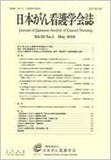Japanese
English
- 販売していません
- Abstract 文献概要
- 参考文献 Reference
- サイト内被引用 Cited by
要旨
本研究の目的は,社会的認知理論を基盤に「リンパ浮腫セルフマネジメントプログラム」を開発し,短期的評価を行い,よりよいプログラムに修正することである.
研究協力の得られたA施設で,1群事後テストデザインによる準実験研究を行った.対象者は乳がん,子宮がん,卵巣がんと診断され,リンパ節郭清術を受けた31名である.対象者にリンパ浮腫セルフマネジメントプログラムを用いた介入を行い,質問紙調査による教育目標の達成度と教育方法の適切性,およびリンパ浮腫の初期徴候の有無からプログラムの短期的評価を行った.質問紙は,リンパ浮腫セルフマネジメントプログラムの教育目標の達成度と教育方法の適切性を問うもので,認識41項目,行動11項目,計52項目で構成した.
質問紙調査の結果,教育目標の達成度と教育方法の適切性において対象者の支持を得ることができた.また,ベースラインと2カ月後の四肢の容積の変化率,リンパ浮腫の症状の項目数を比較した結果,2名(6.5%)に初期徴候が現れたが,早期発見により重症化を予防することができた.個別分析の結果を基に,退院後の仕事などを無理なく続けるための方策に関する内容を修正し,よりよいプログラムになったと考える.
社会的認知理論を基盤とし,がんサバイバーの学習を支援するためのリンパ浮腫セルフマネジメントプログラムは,患者のself-efficacyを高め,リンパ浮腫の3つのマネジメントの習得に有用であると考える.
The purpose of this study was to develop a Lymphedema Self-Management Program based on the social cognitive theory, and conduct a short-term evaluation in order to improve the program. A single-group post-test quasiexperimental study was conducted at a cooperating hospital (A-Hospital). Subjects were 31 patients diagnosed with breast cancer, uterine cancer, and ovarian cancer, who underwent lymphadenectomy. All subjects participated in the Lymphedema Self-Management Program, and a short-term evaluation was conducted using a questionnaire survey regarding achievement of educational goals and appropriateness of the educational method, as well as the assessment of early signs of lymphedema. The intention of the questionnaire, which consisted of 52 items (41 items pertaining to recognition and 11 to behavior), was to probe the achievement of educational goals and appropriateness of the educational method.
The questionnaire survey confirmed the achievement of educational goals and appropriateness of the educational method. Moreover, examination of the percent change in limb volume from the baseline at two months post-intervention and comparison of the number of lymphedema symptoms revealed the development of early signs of lymphedema in two subjects (6.5%);however, early detection prevented the worsening of these symptoms. Based on the results of individual analysis, we were able to improve the program by revising content related to measures for comfortably continuing work after discharge.
We consider our Lymphedema Self-Management Program, which is based on social cognitive theory and aims to support the education of cancer survivors, to be useful for increasing the self-efficacy of patients and achieving the three aspects of lymphedema management.
Copyright © 2016, Japanese Society of Cancer Nursing All rights reserved.


